

8values. What is 8values?
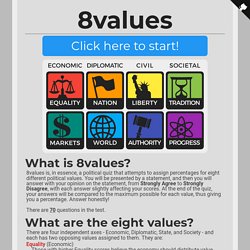
8values is, in essence, a political quiz that attempts to assign percentages for eight different political values. Positive and Negative Liberty. 1.
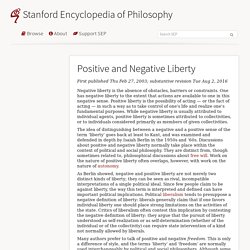
Two Concepts of Liberty Imagine you are driving a car through town, and you come to a fork in the road. You turn left, but no one was forcing you to go one way or the other. Next you come to a crossroads. You turn right, but no one was preventing you from going left or straight on. This story gives us two contrasting ways of thinking of liberty. In a famous essay first published in 1958, Isaiah Berlin called these two concepts of liberty negative and positive respectively (Berlin 1969).[1] The reason for using these labels is that in the first case liberty seems to be a mere absence of something (i.e. of obstacles, barriers, constraints or interference from others), whereas in the second case it seems to require the presence of something (i.e. of control, self-mastery, self-determination or self-realization).
Tcl a. Two Concepts of Liberty: An Inaugural Lecture Delivered before the University of Oxford on October 31, 1958. Isaiah Berlin. The Flap Over Replacement Migration. (June 2000) A draft report on replacement migration by the UN Population Division has captured the attention — and raised the eyebrows — of international audiences.

The report's projections, that over the next 50 years the populations of virtually all countries of Europe as well as Japan will face population decline and population aging, are not surprising. Its conclusion, however — that these twin challenges may require huge influxes of immigrants — has prompted swift reaction from across Europe and Asia.
Migrants Needed by 2050 Migrants needed by 2050 to maintain the ratio of workers to older people. Source: UN Population Division, Replacement Migration, 2000. Replacement Migration: Is It a Solution to Declining and Aging Populations? Among its startling projections: The European Union's population, which in 1995 was some 100 million larger than that of the United States, in 2050 will be smaller than the U.S. population by roughly 20 million. Rise of Empires. Freedom and Responsibility – A Guide to Ethics. The Value of Freedom Some philosophers hold that freedom is intrinsically valuable; it is good for its own sake.
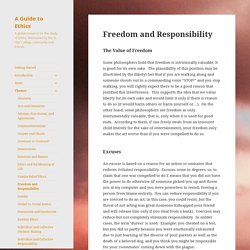
The plausibility of this position may be illustrated by the (likely) fact that if you are walking along and someone shouts out in a commanding voice “STOP!” And you stop walking, you will rightly expect there to be a good reason that justified this interference. This supports the idea that we value liberty for its own sake and would limit it only if there is reason to do so (it would harm others or harm yourself or…). On the other hand, some philosophers see freedom as only instrumentally valuable, that is, only when it is used for good ends. Excuses An excuse is based on a reason for an action or omission that reduces (vitiates) responsibility.
Right to Private Property. The right to private property is the social-political principle that adult human beings may not be prohibited or prevented by anyone from acquiring, holding and trading (with willing parties) valued items not already owned by others.
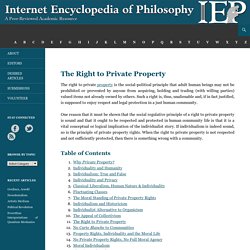
World Socialist Web Site - Marxist analysis, international working class struggles & the fight for socialism. The Putative Fascism of the Kyoto School. Abstract: Kyoto School thinkers have been labeled as fascists by a number of prominent contemporary critics, but their criticisms are not based on good scholarship.
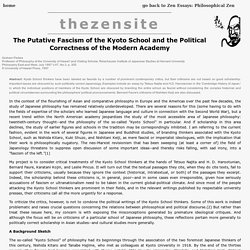
Important issues are obscured by such politically correct Japanology. Examples include an essay by Tetsuo Najita and H.D. Harootunian in the 'Cambridge History of Japan,' in which the individual positions of members of the Kyoto School are obscured by branding the entire school as fascist without considering the complex historical and political circumstances surrounding the philosophers' political pronouncements.
Bernard Faure's criticisms of Nishitani Keiji are also discussed. Laissez Faire Capitalism. "Laissez Faire" is French for "leave alone" which means that the government leaves the people alone regarding all economic activities.
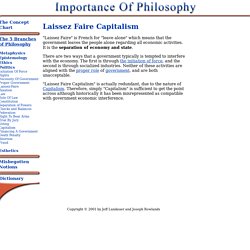
It is the separation of economy and state. There are two ways that a government typically is tempted to interfere with the economy. Political doctrine.
Power and Ideology. Nation vs Culture - What's the difference? Etymology 1 (etyl) ).
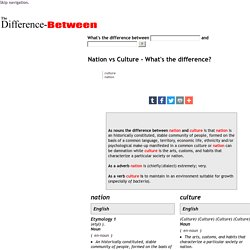
Noun (en-noun) An historically constituted, stable community of people, formed on the basis of a common language, territory, economic life, ethnicity and/or psychological make-up manifested in a common culture (chiefly|historical) An association of students based on their birthplace or ethnicity. Postmodern Politics. First, Second, and Third World. And why is our music called world music?

I think people are being polite. What they want to say is that it's third world music. Like they use to call us under developed countries, now it has changed to developing countries, it's much more polite. Miriam Makeba. ED216631. Free Love: Angela and Ezra Heywood. Feb 13, 2015 Sex radicals Angela and Ezra Haywood published the periodical The Word, often battling censors in their effort to get government out of the bedroom.

The scenery of today’s libertarian movement is, for better or worse, a far cry from that of the radical, varied, and distinctly left wing libertarian milieu of the nineteenth century, a time when libertarians attacked the social and economic status quo with pertinacious spirit. Angela and Ezra Heywood’s trailblazing periodical The Word, published in Princeton, Massachusetts by the couple’s Co-operative Publishing Company between 1872 and 1893,1 presents a confluence of the radical reform projects of its time, from free love, free expression, and feminism to labor reform.
The free love movement based itself on the distinctly libertarian argument that decisions about love, sex, and family planning ought to be completely freed from the sway of ecclesiastical and governmental authorities. 1.) 2.) 3.) What is Marxism. QUESTION: What is Marxism? Marxism is an economic and social system based upon the political and economic theories of Karl Marx and Friedrich Engels.
Syntheses. Intersubjectivity. Education for democracy @ the encyclopedia of informal education. Contents: · introduction · the meaning of democracy and the meaning of education · John Dewey, democracy and education · A. S. Neill on democratic schooling · · further reading and references One of the major tasks that education must perform in a democratic society, Kelly (1995: 101) argues, ‘is the proper preparation of young citizens for the roles and responsibilities they must be ready to take on when they reach maturity’.
Others put the case that this is the aim of education: We can conclude that ‘political education’ – the cultivation of the virtues, knowledge and skills necessary for political participation - has moral primacy over other purposes of public education in a democratic society. Theory and Practice of the Gift Economy. Theory and Practice of the Gift Economy by Genevieve Vaughan Women’s Worlds, Ottawa, July 7, 2011 Download a PDF I have been working on the idea of a gift economy since the 1960’s. In the early days no one was interested or even understood what I was saying but over the years interest in a free economy has grown among people seeking alternative ways of living and the internet has made the term ‘gift economy’ almost a household word.
There are many examples of the gift economy in indigenous societies, and now in EuroAmerica and elsewhere in subsistence economies, in alternative communities, in movements for free stores and free schools. The internet allows new possibilities of collaboration and of forming groups in a horizontal many-to-many ways. Liberalism. What Are Intractable Conflicts?
Definition "Intractability" is a controversial concept, which means different things to different people. Some people on the initial BI project team intensely dislike the term, as they saw it as too negative: intractable conflicts are impossible to resolve, they say, so people think they are not worth dealing with. "Do not use a term that undermines everything we are trying to do," argued project member Andrea Strimling.[1] Nevertheless, all BI participants that we have talked to (which includes many 100s) agree that there is a set of conflicts out there that are hard to deal with. "Protracted. " Political science. Socialinclusionusa. The five faces of social inclusion: Theory and methods underpinning approaches to the measurement of social inclusion for children with disabilities - School of Sociology - ANU. Date and time: Mon, 27/08/2012 - 13:00 - 14:00 Rebecca Taylor, Postdoctoral Fellow, School of Sociology, ANU, Larry Saha Room, Haydon Allen Building #2175 ‘Social inclusion’ is increasingly identified within key policy documents as a desired outcome for people with disabilities.
Welfarism - Encyclopedia of Health Economics - Welfarism and Extra. J. Bp1. Culture definition. Fascism: The Concise Encyclopedia of Economics.